Level 4 – Lockdown: 26 March 2020 – 27 April 2020
Risk: Likely the disease is not contained
New Cases: 1400
Range of Measures:
- People instructed to stay at home in their bubble other than for essential personal movement.
- Safe recreational activity is allowed within local area.
- Travel is severely limited.
- All gatherings cancelled and all public venues closed.
- Businesses closed except for essential services (e.g. supermarkets, pharmacies, clinics, petrol stations) and lifeline utilities.
- Educational facilities closed.
- Rationing of supplies and requisitioning of facilities possible.
- Reprioritisation of healthcare services.
What these measures meant for the Matthew Cowley Pacific Church History Centre was total closure. Not only were we, the Hamilton Mission administration, and everyone else working in the Mendenhall Building told to stay at home until further notice, but the facilities manager was instructed to disable all our electronic keys so we wouldn’t be tempted to sneak in and continue working. Indeed, all the Church’s meetinghouses and offices throughout the country were declared similarly off-limits. Gated parking lots were locked shut, and entrances without gates were blocked with traffic-safety cones. Entrances to the carpark that serves the Mendenhall Building, the adjacent stake center, and the historic buildings of Legacy Park not only were barricaded with orange cones, but also were guarded around the clock by a security detail. One person, and one only, was allowed to enter the Mendenhall Building once a day to check for emergent situations such as fire, leaks, or vandalism. Church leaders did not want anyone passing by to have any reason to suspect that the Latter-day Saints were not in full compliance with government safety regulations.
As the lockdown began and the MCPCHC’s seven full-time missionaries tried out the workstations Michael had set up in our separate flats, we discovered a couple of defects that needed immediate attention. Accustomed to working with multiple screens simultaneously, Michael had brought home two extra monitors but neglected to bring a connecting cable for one of them. A more serious issue was a very weak wireless internet signal in Sister E’s workspace. Diane lives in a Church-owned 1960s-era building near the Centre that is affectionately known as “The Nunnery” because it used to house female faculty members of the Church College of New Zealand. Diane already knew that the wireless signal in her flat was basically nonexistent because the only modem in the building, located in the basement laundry room, is too far away from her end unit. However, she had discovered that the empty unit next door, to which she happens to have a key, had a slightly stronger signal. So Michael set up Sister E’s workstation in the empty flat, hoping to get a wireless booster to amplify the signal enough to allow her to work. However, with electronics stores such as PB Tech and Noel Leeming shuttered, one could not simply nip out to buy a wireless booster, nor another monitor cable. Thus began a couple of “Mission: Impossible” capers to rectify the connectivity problems.
Michael knew that there were some extra cables in the workroom at the MCPCHC, but had no way to get them because our keys to the building had been deactivated. But all was not lost. Hoping to retrieve a folder he had left behind without being caught by the security guards, Elder G had sneaked across the parking lot under cover of darkness and attempted to enter the Mendenhall Building using his key, just in case it still worked. It did! Then, having obtained what he needed, Barry was thoughtful enough to call the rest of us to ask if there was anything we had forgotten that he could get for us before the facilities manager noticed his key had not been disabled. So Michael told him that he needed a monitor cable and described where to find one. A while later Michael got a phone call informing him that the cable had been left on our doorstep. The cable transfer may have required an unauthorized entry into the MCPCHC, but neither Barry nor Michael could be accused of violating the prohibition against face-to-face contact with anyone outside their own household “bubbles.”
Obtaining and installing a wireless booster in Diane’s workspace was a little more complicated. Michael had told Barry that Sister E needed the booster to be able to work from home, but wasn’t sure where one could be found. Barry suggested that he call Elder A, the former full-time missionary Michael had replaced, thinking that perhaps Elder A might know whether there was a wireless booster somewhere in the MCPCHC that we could borrow. Elder A, who lives only a few kilometres up the road from the Centre, told Michael that—miraculously— he happened to have an extra wireless extender at home. “I’d be happy to lend it to you,” he said. “I’ll set it out next to my letterbox.” Michael then dispatched Barry to pick up the booster and deliver it to Diane’s doorstep. Barry rang Diane to explain what was happening, and then informed Michael that the booster was now at The Nunnery, ready for installation. While MIchael was driving over, Diane unlocked the unoccupied flat and placed the booster inside, where Michael could find it, and then returned to her own apartment before MIchael arrived to install it. Once again, the mission was accomplished without any illegal face-to-face contact among the participants.
In hindsight, all our precautions to avoid possible viral exchanges seem almost silly, but in those early days of pandemic uncertainty, even the simplest activities seemed fraught with risk. Not only was there the chance of becoming infected with or unwittingly spreading a dread disease, but anyone out in a car ran the risk of being fined should they be unable to prove that they were on an essential errand if stopped by the police. As badge-wearing representatives of The Church of Jesus Christ of Latter-day Saints, we were committed to scrupulous adherence to the rules—but we also didn’t want Sister E to be trapped in her flat with no internet for a month or more.
When we contracted for internet service in our flat shortly after we arrived in New Zealand, we thought we would need it only for email and transacting minimal business; certainly we did not anticipate playing video games or streaming movies. Thus the bandwidth we had at home was more than enough for the level of activity we had projected back in January, but it wasn’t anywhere near what was needed for the task Michael hoped to accomplish during the lockdown: analyzing the digital files in Rangi’s collection, affectionately known as “The Sandbox.” (See a previous blog entry for a detailed description of these files and Michael’s objective for them.) When Michael contacted our internet service provider to ask about increasing bandwidth so we wouldn’t incur penalties for going over our limit, the Vodafone customer service rep told him that limits on all data plans would be suspended during the lockdown. This sounded like great news, but when Michael read the new policy’s fine print, he discovered that the limit suspension did not apply to the type of service we had. Fortunately, he realized this just before we surpassed our limit, but at that point, getting through to another customer service rep was not easy; it seemed that half of New Zealand was trying to call Vodafone, too. After a very long wait on the last day before we would start racking up excess service charges, a Vodafone rep who knew exactly what to do came on the line. Michael was extremely relieved that the rep was able to change our plan to one with a higher data limit, effectively immediately. Apparently, the Lord wanted his work to proceed.
Prior to being shut out of the MCPCHC, our missionary cohort had met each morning at 9:00 in the Centre’s Reading Room to begin our workday with a devotional. Although we could no longer gather around the conference table, we were able to continue our devotional meetings virtually, thanks to Microsoft Teams—the same platform we had been using already to counsel with our teammates in Salt Lake City. Those virtual devotionals became a highlight of our day as we shared scriptures, favorite quotations, uplifting videos, songs, and our own spiritual experiences with each other. What was originally intended as a five-minute thought and prayer to begin a staff meeting often stretched into a half-hour talk, but no one seemed to mind delaying work-from-home a little longer each morning. We also took advantage of the Teams platform to hold virtual Sunday School discussions based on the weekly Come, Follow Me curriculum provided by the Church, as well as Monday night Family Home Evening activities. Sometimes we played games: Farkle, Yahtzee, and the House Party app all worked well for remote participation. Pictionary produced some memorable moments, such as when Barry tried valiantly but unsuccessfully to get us to recognize that he was drawing a shrimp, and so did Act Out, as when six of us attempted to demonstrate ski jumping well enough for Diane to guess what the heck we were doing. And because FHE just wouldn’t be complete without treats, we took turns providing them, baking cookies and cakes and fruit crumbles, and then delivering the goodies to each others’ doorsteps each Monday evening. It was like what our kids used to call RADAR (ring a doorbell and run), but without the element of surprise—and often without running, because usually we’d end up chatting for several minutes while maintaining the required two-metres distance across the driveway.
About a week into the lockdown, Eva proposed holding a virtual dinner party so we could at least share conversation even if we couldn’t share a meal. We took as much pleasure in hearing descriptions of what was on the menu in our individual households as we would have reading the menu at a new restaurant. When we were finished eating, we played “Two Truths and a Lie,” in which we learned that while Eva—known to be an avid runner—has never run a marathon, Barry has completed two of them. Other personal revelations: Diane’s first job was as a keypunch operator; Wendy had taken guitar lessons from Marvin Payne; Alan’s earliest memory is of watching his house burn down when he was two years old, and he can speak and read at least a little Hebrew, Hindi, and Hopi. But surely the most astonishing thing we learned that night was that when Eva was in high school, she kissed Elvis Presley. The real Elvis Presley. Really! (But only on the cheek.)
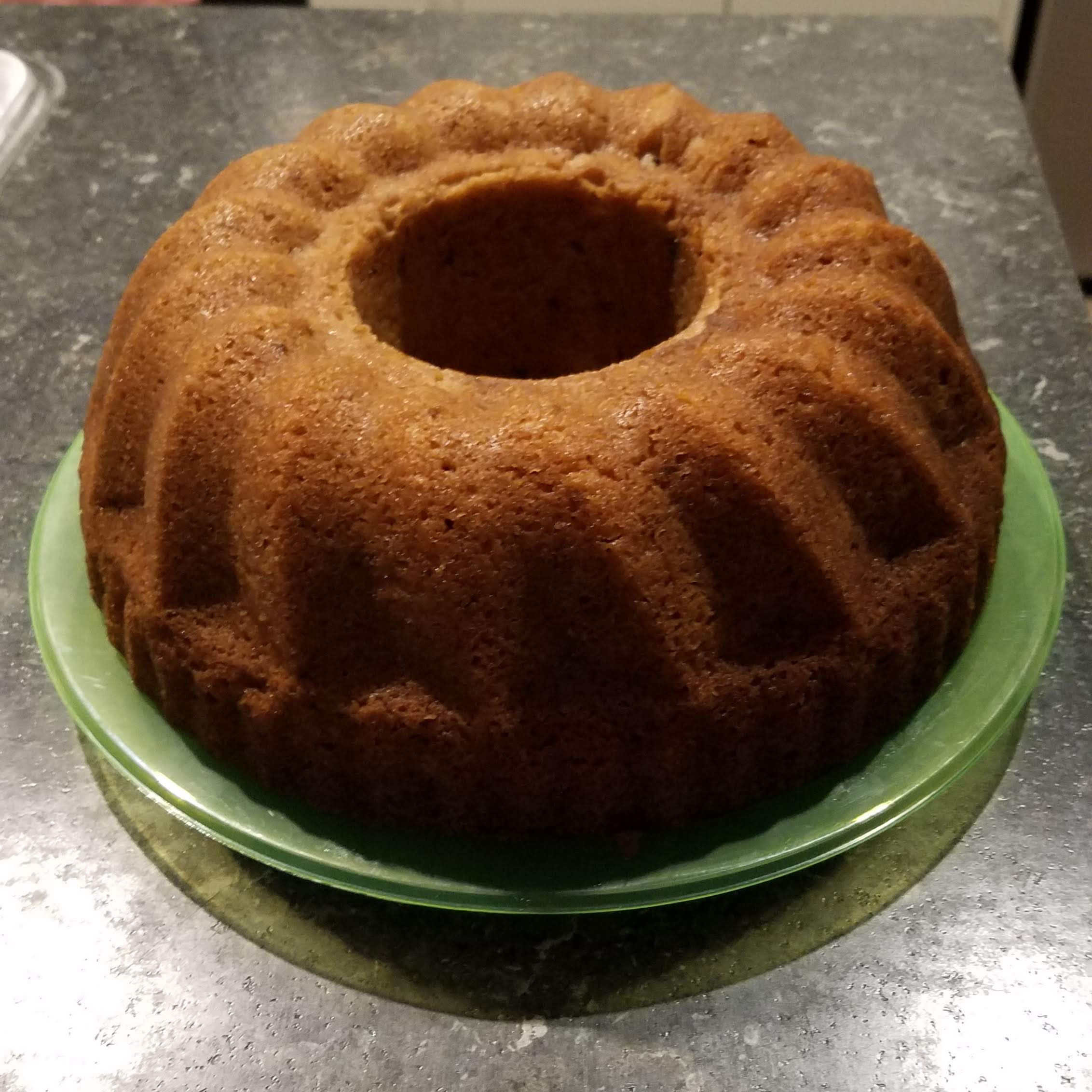
One of Michael’s feijoa cakes
One month into the lockdown, when it became apparent that Level 4 restrictions were not going to be lifted anytime soon, Barry asked each of us to get ready for the next Family Home Evening by considering Mary Poppins’s advice for dealing with difficult situations, and then coming prepared to share “a few of our favorite things.” (No matter that he had mixed up his Julie Andrews movies, confusing Mary Poppins with Maria von Trapp—we knew what he meant.) That evening, Alan confessed that in addition to finding solace and fulfilment in studying the scriptures, he also enjoys escaping into fantasy novels and movies (LOTR is a favorite). Eva likes listening to general conference talks in the shower—and is thankful that her nearest neighbors are many meters away, so she can turn the volume up without disturbing anyone but Barry. Creating hand-smocked children’s clothing is another of her favorite activities. Diane finds joy in conversing with family and friends, traveling, and trying new things; this is when we learned that she had been to Antarctica, among other exotic places. Wendy’s favorite activities include gardening and recording things; perhaps the latter love is why she was called to a mission as an oral history specialist. Barry shared one of his favorite things in the form of homemade Shrewsbury biscuits—which evoked tender memories of his Kiwi mother. We all enjoyed eating the samples he had delivered to our doorsteps that afternoon while watching and listening to another of his favorite things: music by Noteworthy. (Our Montgomery Ward friends may recognize Alyssa Hazen as the featured soloist in the recording of Amazing Grace that Barry chose to play that night.) Michael’s favorite things followed the same pattern as Barry’s: food and good choral music, but the piece he chose for us to listen to was Morten Lauridsen’s O Magnum Mysterium. (He’d already shared the results of his baking binges: bread, brownies, bran muffins, and several feijoa cakes.) Nancy’s favorite things also were musical: Fantasia on a Theme by Thomas Tallis by Ralph Vaughan Williams for when she’s feeling sad and isn’t yet ready to be cheered up, and writing new lyrics to familiar songs when she wants to cheer up others as well as herself. To demonstrate the latter, she debuted a new song parody for the occasion: a Kiwi-oriented version of At the Hop called At the Op. (Someday, a link to a recording of the latter may be added to this post, but we don’t have one yet.)
The following Monday night, when it was Wendy and Alan’s turn to plan FHE, they suggested that we play the “Ungame.” Players rolled a die to determine which of a series of questions they would be asked to answer during that round. All the questions were designed to provoke responses that would help participants learn more about each other. For example: What was your life like at age fifteen? Barry told us that he had been absorbed by sports—chiefly cricket and rugby—when he wasn’t helping his father harvest and pack produce from the family’s hothouses for shipment to grocery stores across New Zealand. Eva, Wendy, and Nancy all remembered the fun they had going to church dances when they were fifteen, but Diane shared that age fifteen had been difficult and lonely for her because her family had moved to a different state just before school started. Michael remembered learning to play the viola, and having to drive to Idaho Falls so he could participate in an orchestra. Alan skipped that question, having already described the experiences of his fifteenth year during a previous discussion. (His teenage rebellion became so acute that he decided to leave home and move to another town, even though doing so meant switching to a different high school as he began his junior year.)
Our missionary cohort were not the only people we virtually connected with during the lockdown, as many of our family and friends in the U.S. had similarly confined themselves at home to avoid contracting COVID-19, even if their state and local governments had not mandated such restrictions. We enjoyed frequent videochats with our children and grandchildren (including a couple of games of Pictionary that might best be described as hysterical), and occasional, more sedate conversations with some of our empty-nester friends. In addition, we joined a few ZOOM meetings sponsored by Montgomery Ward. One of these was an enlightening Sunday School discussion about Joseph Smith’s various accounts of his 1820 visit from God the Father and Jesus Christ—the marvelous event that led to the re-establishment of The Church of Jesus Christ on earth—led by Dale and Brenda B, who had served as directors of the Church’s Visitors Center in Palmyra, New York, where the vision took place. Nancy participated in another ZOOM meeting at which members of the Relief Society shared their favorite moments from the Church’s general conference and discussed how the messages had motivated them to listen more carefully to the voice of the Lord. Michael and Nancy abandoned the attempt to join Montgomery Ward’s weekly Sunday ZOOM meetings, however, when the U.S. went on daylight savings time and New Zealand reverted to standard time, creating an even wider gap in the difference between our time zones. It was one thing to get up at 6:00 a.m. to participate in a sacrament meeting, but getting up at 4:00 a.m. to do the same was a sacrifice we weren’t prepared to make every Sunday,
We did, however, rise from bed a little before 4:00 a.m. on Sunday 5 April so we could watch the opening session of the worldwide conference of The Church of Jesus Christ of Latter-day Saints live from Salt Lake City. At the last general conference in October 2019, Russell M. Nelson, prophet and president of the Church, had promised that this would be a historic one, commemorating the two-hundredth anniversary of the divine visitation to Joseph Smith. At the time, no one had expected that this conference would be doubly historic: the first to be held with no congregation physically present in the same room with the speakers. Only the people participating in that particular session attended, each seated at least six feet away from the others, and the only musical numbers (or “items,” as we say here in New Zealand) were recordings of past performances of the Tabernacle Choir because gathering such a group for either rehearsal or performance was now prohibited. Although President Nelson and other speakers acknowledged the COVID-19 crisis, calling on Church members and people of faith in all nations to observe Good Friday with fasting and prayers for relief from the pandemic, the mood of the conference was hopeful and uplifting.
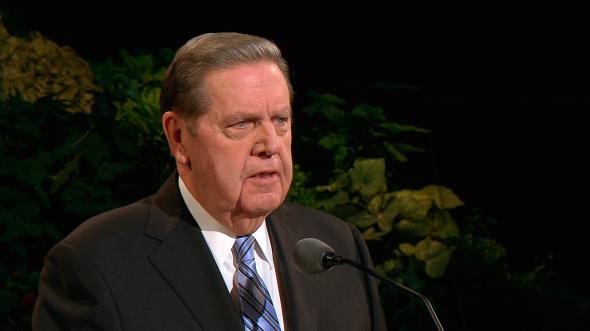
Elder Jeffrey R. Holland
We especially appreciated a talk by one of the apostles, Jeffrey R. Holland, about how so many things people of the past once hoped for were fulfilled through the coming of Christ, and then through the restoration of Christ’s church to the earth. But, he added, “we still have hopes that have not yet been fulfilled. Even as we speak, we are waging an ‘all hands on deck’ war against COVID-19. … When we have conquered this—and we will—may we be equally committed to freeing the world from the virus of hunger, freeing neighborhoods and nations from the virus of poverty. May we hope for schools where students are taught—not terrified they will be shot—and for the gift of personal dignity for every child of God, unmarred by any form of racial, ethnic, or religious prejudice. Undergirding all of this is our relentless hope for greater devotion to the two greatest of all commandments: to love God by keeping his counsel and to love our neighbors by showing kindness and compassion, patience and forgiveness. These two divine directives are still—and forever will be—the only real hope we have for giving our children a better world than the one they now know.”
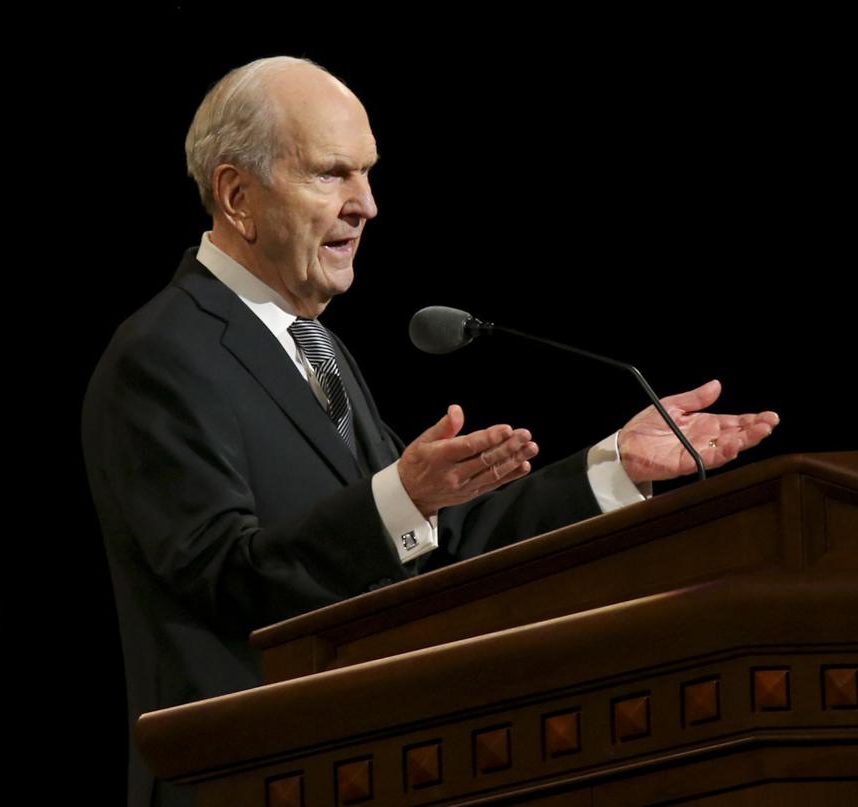
President Russell M. Nelson
Speaking several times during the course of the two-day conference, President Nelson testified: “I know that God ‘has all power, all wisdom, and all understanding; he comprehendeth all things, and he is a merciful Being, even unto salvation, to those who will repent and believe on his name’ (Alma 26:35). So, during times of deep distress, as when illness reaches pandemic proportions, the most natural thing for us to do is to call upon our Heavenly Father and His Son—the Master Healer—to show forth Their marvelous power to bless the people of the earth.”
“Our Father knows that when we are surrounded by uncertainty and fear, what will help us the very most is to hear His Son. Because when we seek to hear—truly hear—His Son, we will be guided to know what to do in any circumstance.”
“Next Sunday is Easter Sunday, when we again commemorate the Atonement and Resurrection of our Lord Jesus Christ. Because of his Atonement, His gift of resurrection will come to all who have ever lived. … Regardless of where you live or what your circumstances are, the Lord Jesus Christ is your Savior.”
We, too, testify that Jesus Christ is our Savior, and that through his grace we can overcome any challenge.
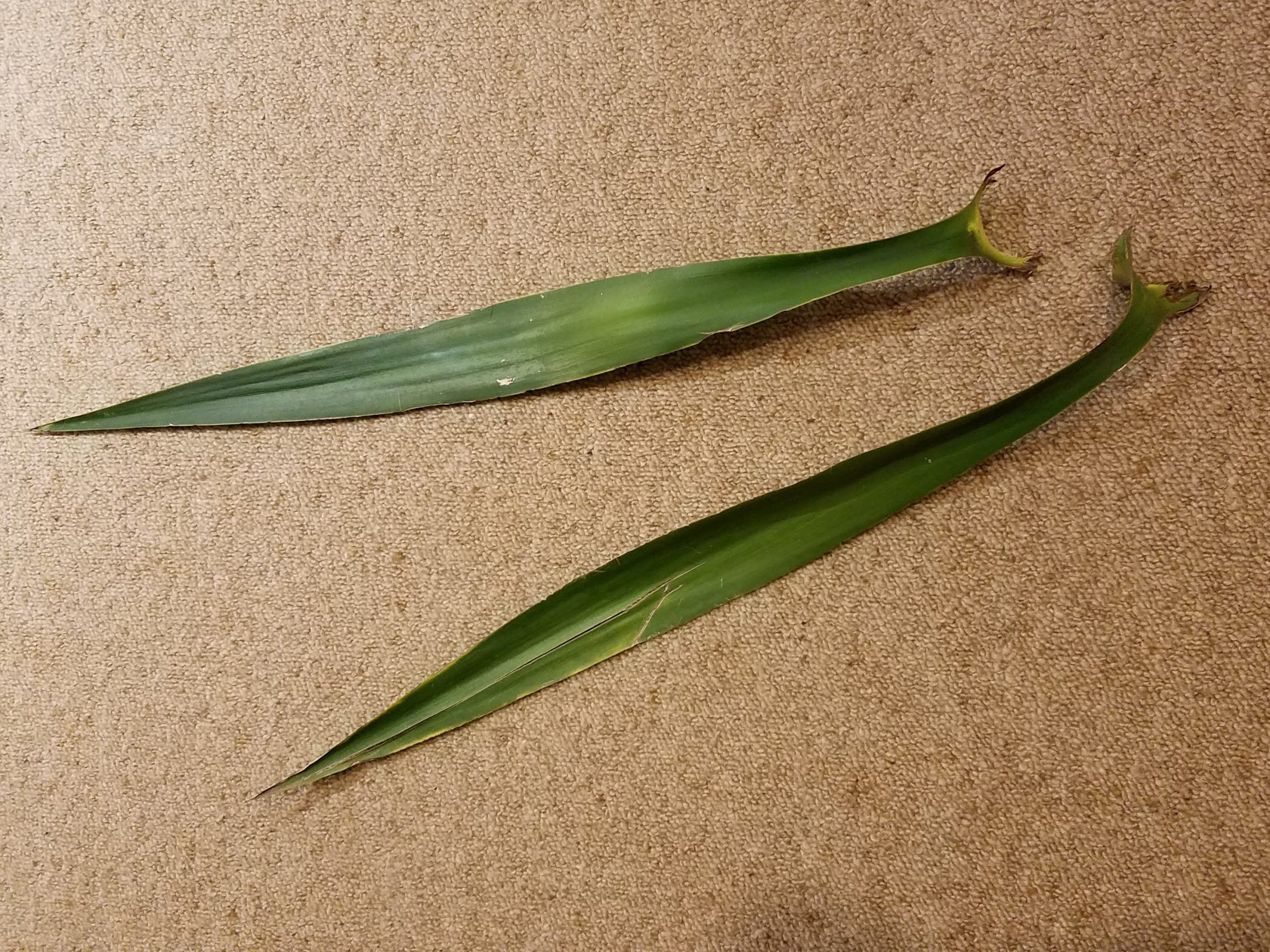
Palm leaves rather than white handkerchiefs
At the end of the Sunday morning session of general conference, President Nelson led Church members in the “Hosanna Shout,” commemorating both the 200th anniversary of Heavenly Father and Jesus Christ’s appearance to Joseph Smith, and Palm Sunday. Most people waved white handkerchiefs as instructed, but because palm leaves were more readily available to us than handkerchiefs, we chose the more ancient option.

Wendy and Alan participate virtually in our Good Friday Passover seder dinner
A month or so before the Easter/Passover season began—and before we knew that by Easter, the whole country would be in lockdown—Nancy had the idea of holding a Passover seder with our missionary cohort, as we had done in 2019 with our Cincinnati empty-nesters group. This year, the beginning of Passover coincided with the night before Good Friday. We had decided that it would be all right for this group of non-Jews to hold our seder the following evening because the Centre would be closed for Good Friday (a national holiday in New Zealand), so we would have plenty of time during the day to prepare a special meal. As it turned out, the Centre was closed a lot longer than that one day, but Good Friday still seemed to be an appropriate time to remember God’s goodness to those who obey him—especially after President Nelson asked everyone to spend that day in fasting and prayer. We wouldn’t be able to gather in one household to share a meal as we broke our fast, but we could gather virtually, so Nancy emailed instructions and recipes for preparing necessary items for the seder menu, and Michael sent copies of the haggadah (the traditional seder text) with assignments of who would read which sections. Nancy also spent several hours during the days prior to the event researching traditional melodies and practicing her Hebrew pronunciation so that she could be the cantor. Wendy happened to have a package of tealight candles, so she delivered one to each household for the women to light as we began the ceremony at sundown on Friday 10 April.
Recalling the plagues God inflicted on the Israelites’ Egyptian oppressors and commemorating the passing-over of the destroying angel as the children of Israel prepared to flee from bondage was particularly poignant this year as we fasted and prayed for relief from the plague of COVID-19. As we ate the matzoh and bitter herbs, we thought not only about the hasty flight of the ancient Israelites, but also the hasty flight of Latter-day Saint missionaries around the world who had been sent back to their home countries within the past several days, often with less than a day’s notice. We gave special thanks that the reassigning angel had passed over the missionaries of the Matthew Cowley Pacific Church History Centre, allowing us to stay in New Zealand and continue the work we were called to do. And as we consumed our lamb chops, we were moved to remember Jesus Christ, the ultimate sacrificial Lamb.
Although annually observing the Feast of Unleavened Bread and the Passover was mandated by God in ancient times (see Exodus 12:17; 2 Kings 23:21), Christians haven’t kept up the tradition. We probably should, because the story is so richly symbolic of humankind’s deliverance from the bondage of sin and death through the Atonement of Jesus Christ. Jews may not realize that another part of the Passover tradition, setting a place at the table for Elijah and opening the door to see if he has come to join the feast, has special significance for Latter-day Saints. Malachi prophesied that Elijah would return “before the coming of the great and dreadful day of the Lord” (see Malachi 4:5-6), so observant Jews are still waiting for him to arrive. But Latter-day Saints believe that Elijah has already come. On 3 April 1836, Joseph Smith and his friend Oliver Cowdery were praying in the newly dedicated temple in Kirtland, Ohio, when they experienced a series of marvelous visions. The first was of Jesus Christ, indicating acceptance of the temple as his holy house. That glorious vision was followed by the appearance of Moses, Elias, and finally Elijah, who came to confer the various priesthood keys they each held upon Joseph and Oliver, thus restoring to the earth all the authority God has ever delegated to his children. Elijah conferred upon Joseph and Oliver the power to bind families together for eternity, and—by “turn[ing] the heart of the fathers to the children, and the heart of the children to their fathers”—initiated a renewed worldwide interest in genealogical research. (Details of this vision are recorded in Doctrine & Covenants 110—it’s a short section, and definitely worth a read.)
The next day, Easter Saturday, we took a long morning walk and then spent the afternoon watching a performance of Handel’s Messiah recorded in 2018 by the Tabernacle Choir at Temple Square (formerly known as the Mormon Tabernacle Choir—the “MoTabs” have now become the “Tabby CATS,” haha). It was enjoyable because it featured our talented friend Amanda Woodbury as the soprano soloist (not to mention our talented friend Mack Wilberg as the conductor), but now that we’ve heard a good recording of Messiah in its nearly-three-hour entirety, we decided that in the future we’ll be satisfied with listening only to our favorite selections.
After rising at our usual time (6:30 a.m.) on Easter morning, we went out for our usual walk before breakfast, but what was unusual was that whenever we met someone on the street (not many that early on a Sunday morning, and carefully maintaining two-metres’ distance) we called out, “Happy Easter!” and they greeted us with “Happy Easter!” in return. It was almost as good as experiencing the lovely Easter tradition that our daughter Stella had enjoyed while serving a mission in Romania: during the entire week before Easter, Romanians greet each other with “Hristos a înviat!” (“Christ is risen!”) and then respond, “Da el este!” (“Yes, he is!”). Stella says the tradition persists even among those who aren’t particularly religious, but it’s especially meaningful for those who retained their hope in Christ through the long years when atheism supplanted Christianity as Romania’s national religion.
Our Easter worship service was conducted virtually with our missionary cohort. Michael opened the meeting with a medley of Easter hymns, played on his pennywhistle. The remainder of the time followed a loose structure that Eva had suggested to us a few days earlier: each person had a chance to share one way the atonement and resurrection of Jesus Christ have impacted us. Michael told about an experience he had while in training for his first mission: While feeling like an utter failure after his first attempt to teach a lesson in French, he had been consoled by the almost tangible arms of the Savior, assuring him of his acceptance and love. Nancy shared that earlier in the week, when a “study question” in the Forgiveness section of the Church’s Easter Study Resources app had suggested asking ourselves: “Who do you need to forgive?” she had not been able to think of anyone. No one has hurt me, she thought. No one has offended me. But then she remembered reading an article from The Atlantic the night before, entitled, “It’s All Trump’s Fault,” and realized that someone had indeed hurt her, her family, and many others. “I realized,” she said, “that I need to forgive Donald Trump.” Remembering that “[s]he that forgiveth not [her] brother his trespasses standeth condemned before the Lord; for there remaineth in [her] the greater sin” (D&C 64:9), she felt chastened—but consoled by the thought that Christ’s atonement provides not only forgiveness from sin, but also healing comfort for those who have been hurt by others’ selfishness and spite. Eva brought an end to our Easter service by playing a clip from Bruce R. McConkie’s April 1985 general conference talk: the last testimony he gave in public before he died about two weeks later, and surely one of the most powerful, unforgettable witnesses of Jesus Christ we have ever heard.
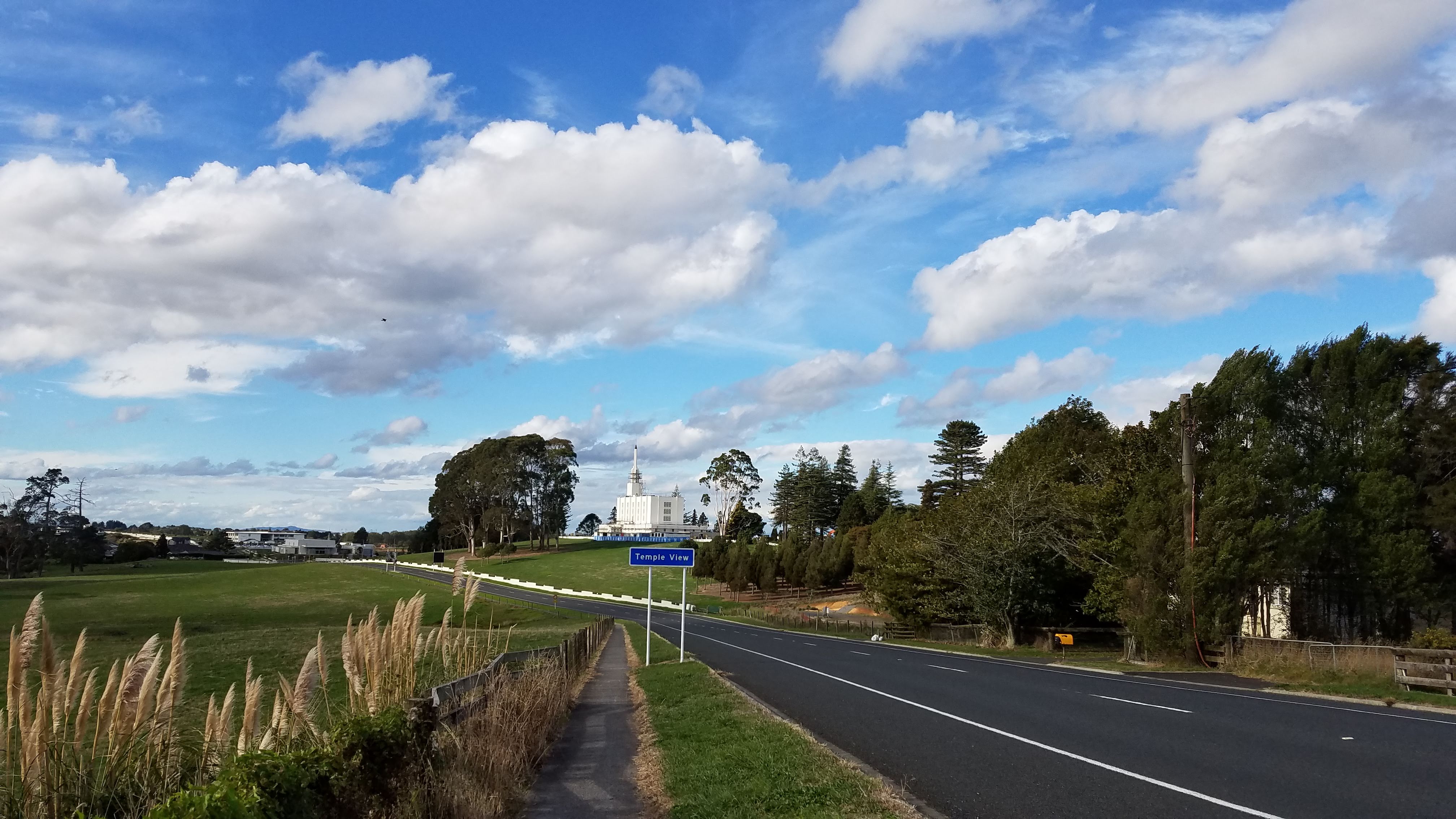
Looking up Tuhikaramea Road toward the temple on Easter Sunday
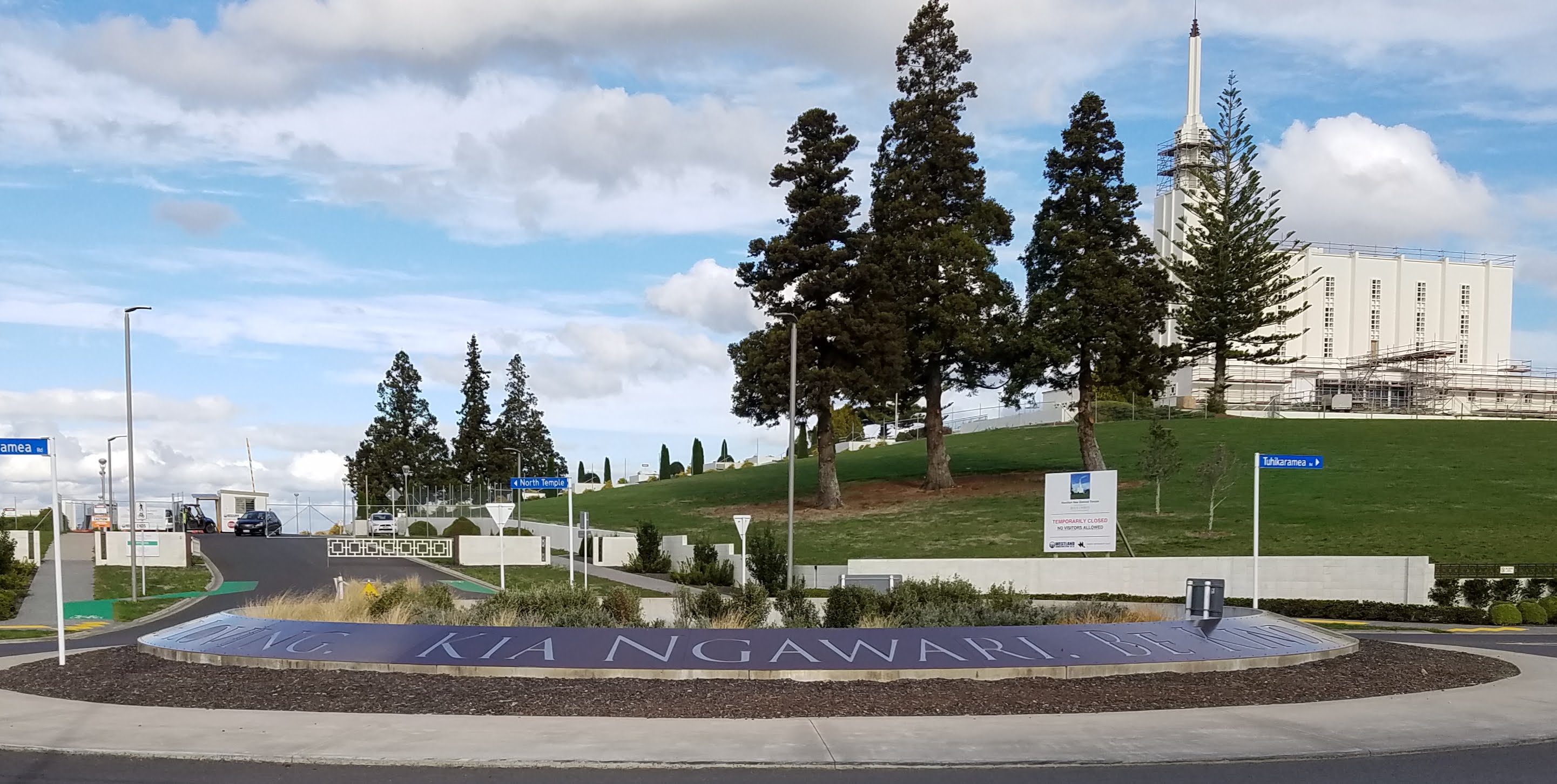
The the roundabout near the temple reminds passersby to “Kia Ngawari: Be humble. Be loving. Be gentle. Be kind.”
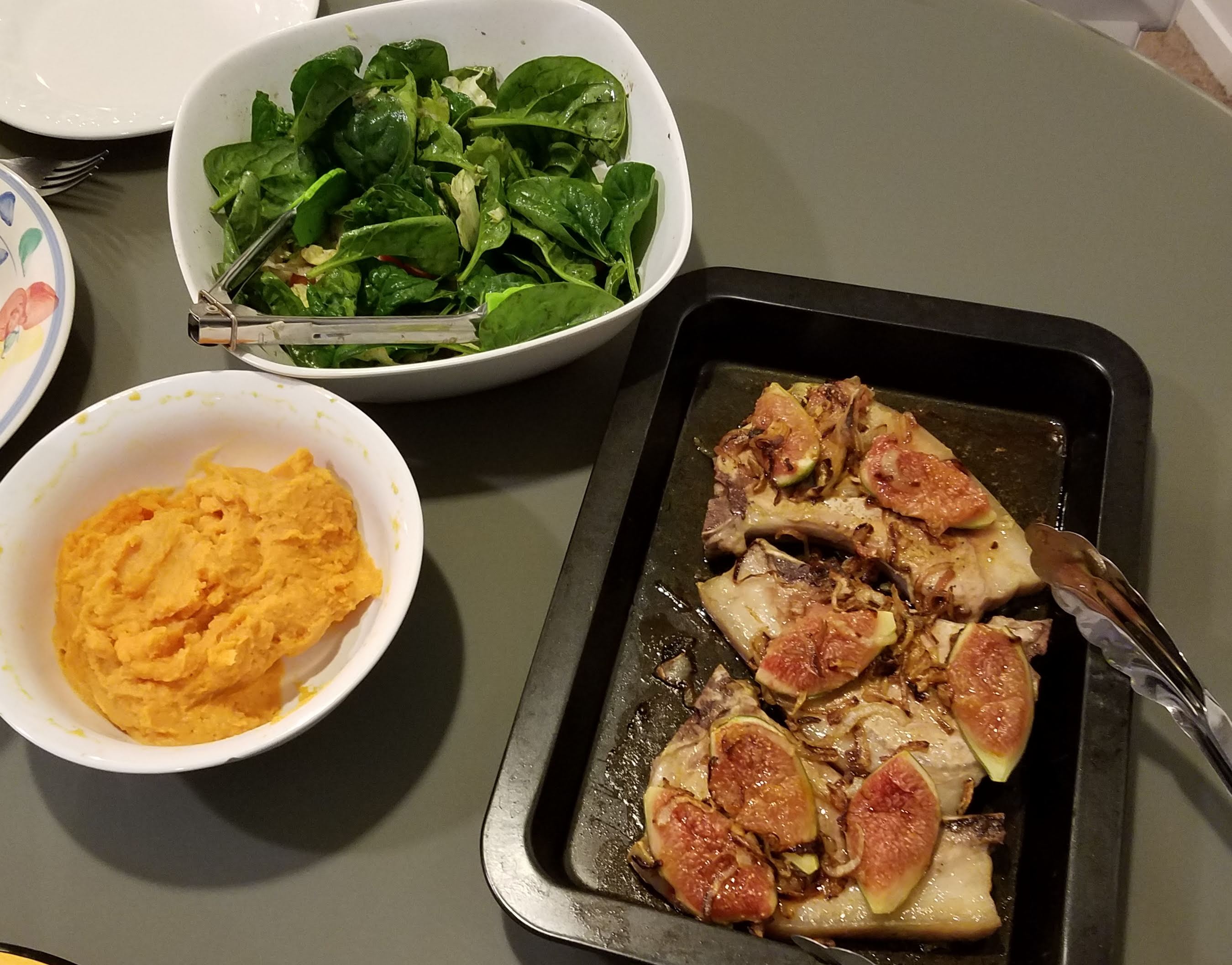
Our Easter feast: pork chops with figs and caramelized onions, mashed kumara and spinach salad
We continued our Easter celebration that afternoon by driving to Temple View and walking up and down Tuhikaramea Road in the warm sunshine. This is the road that takes travelers past the Matthew Cowley Pacific Church History Centre, the David O. McKay Stake and Cultural Events Centre, and the Hamilton New Zealand Temple. All three buildings were closed that day, even their parking lots barricaded and inaccessible to everyone except a few security guards by the universal fear of COVID-19. But we felt hopeful that through the atonement of Jesus Christ, all the suffering and sorrow caused by this modern-day plague will someday be swept away and replaced with unspeakable joy.
I really enjoyed reading your report and seeing the impact of Covid on your mission. Most of all I loved your closing statement, “Through the atonement of Jesus Christ, all the suffering and sorrow caused by this modern-day plague will someday be swept away and replaced with unspeakable joy.” These are the same feeling expressed by the Prophet and General Authorities. The last I heard from our Prophet I heard is this will be a long bumpy road. I’m willing to hang on for the ride and try to come closer every single day to the Lord. I know a couple that returned from their mission in the New Zealand area and they would like to be included on your posts. How do I do that?
What a rich experience you are having, even in this time of relative isolation. It was beautiful to read how everyone’s interests and gifts have come together to sustain one another. And the Holland quote was one of my favorite from all the conference talks. Carry on!